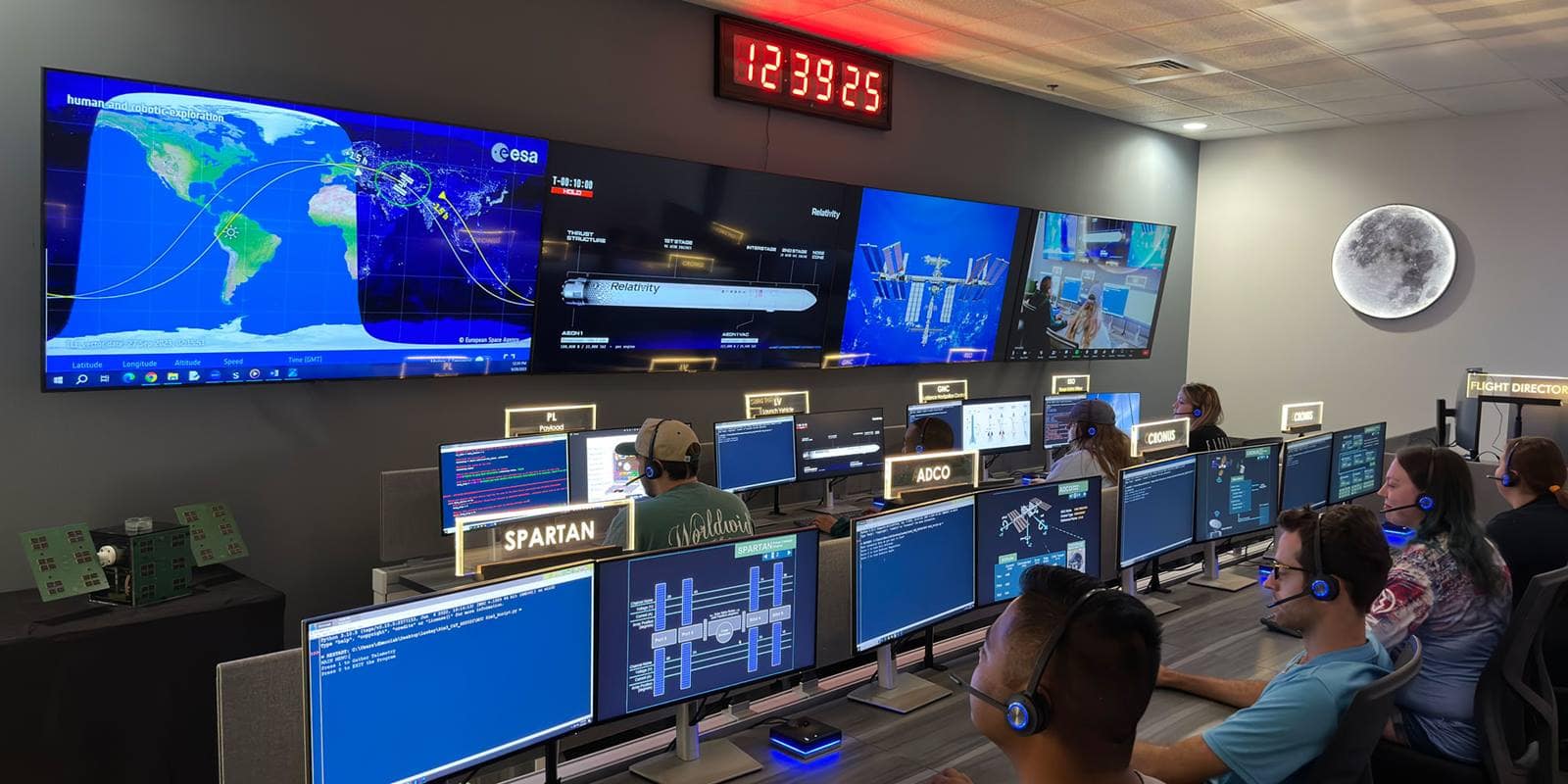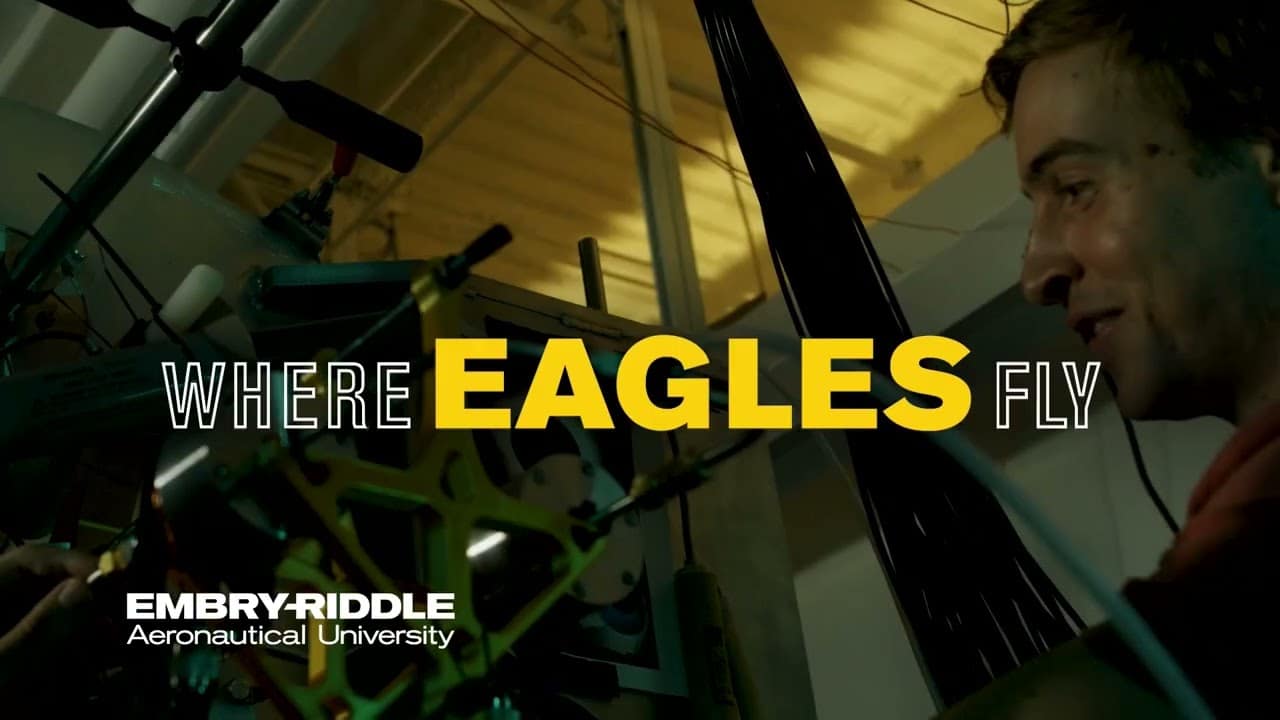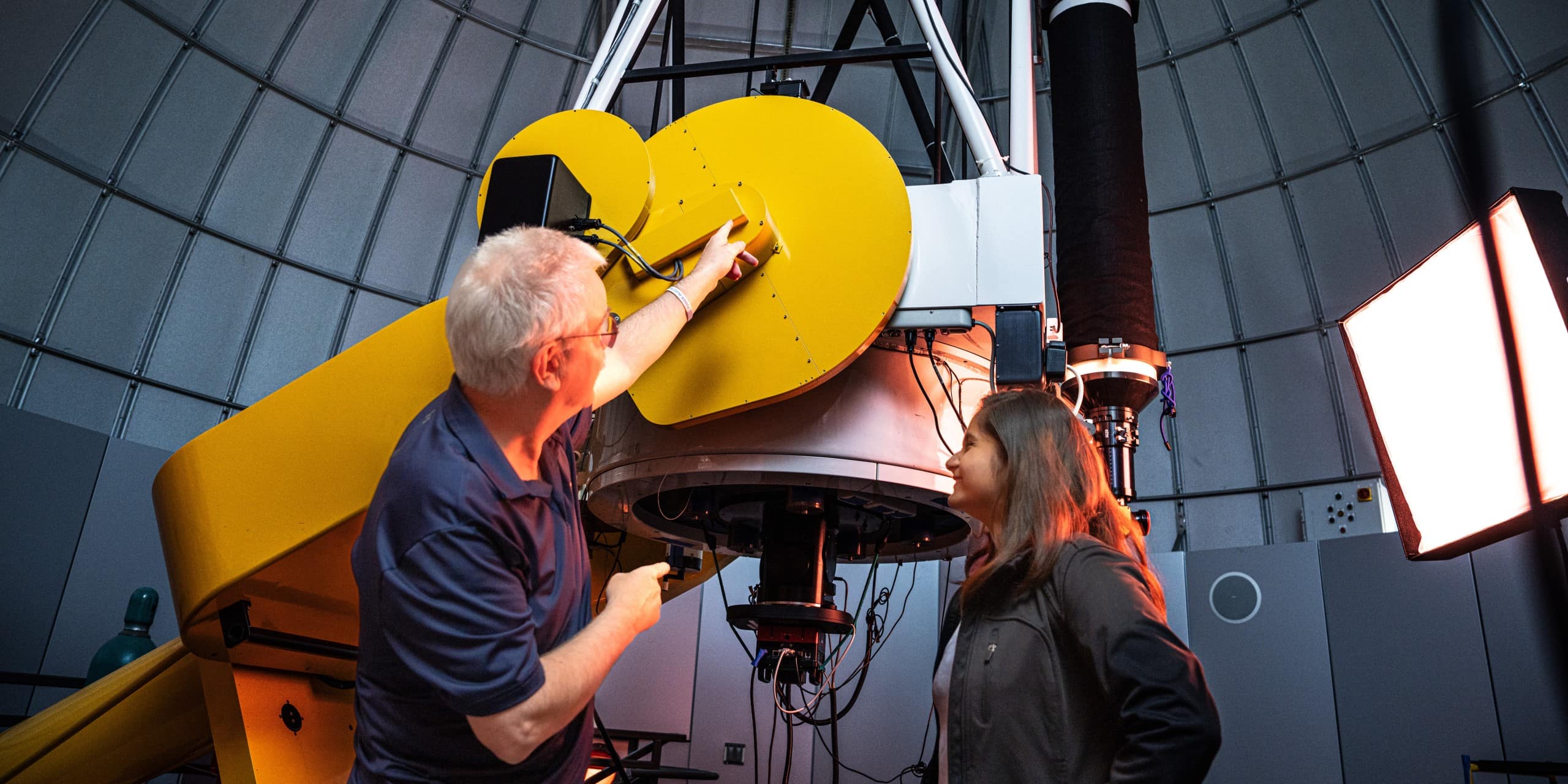
Bachelor of Science in
Space Operations
The Bachelor of Science in Space Operations focuses on mission operations, payload integration, space research, human factors and space policy.
About the Bachelor of Science in Space Operations
At Embry-Riddle, the Bachelor of Science in Space Operations connects principles from both the space industry and regulatory agencies, teaching you to solve challenges in disciplines such as mission operations, mission training and launch licensing. The interdisciplinary nature of a degree in space operations prepares you to integrate the many different factors involved in space operations into real-world scenarios after graduation.
This non-engineering degree program has been developed in collaboration with the commercial space industry and affiliated space agencies, such as NASA and the FAA-Commercial Transportation Office (FAA-AST), to ensure that you develop the skills needed for success and advancement in the space industry.
Why You Should Study This Degree
Space operations focuses on the exploration and management of outer space, including launching satellites, operating spacecraft and conducting scientific research. A career in space operations may be for you if you like:
- Learning about space missions.
- Exploring planetary science and the wonders of the cosmos
- Studying, building and operating satellites.
- Researching forces and motion in space.
Student Learning Outcomes
Opportunities you will have as a space operations major:
- Creating space mission design, planning or execution relevant to current industry practices.
- Evaluating spacecraft systems, applications, sustainability and safety practices within the space operations industry.
- Analyzing human spaceflight history, life support implications and training regimens from historical and contemporary programs.
- Analyzing space policy development and application to space activity.
- Identifying space mission history, program development and evolution to current trends.
Space Operations Career Opportunities
Careers and Employers
Setting a standard of success, Embry-Riddle graduates are set to enter the workforce with a placement rate of 93.8% within a year of graduation, often finding roles with industry leaders such as:
- NASA Mission Control (Houston)
- Blue Origin
- Northrop Grumman
- Airbus (OneWeb) Satellite
- SpaceX
Graduates with a space industry degree often secure roles as:
- Launch Operations Engineers
- Satellite Console Operators
- Space Systems Engineers
- Space Suit Engineers
Space Operations Salary Information
A degree from Embry-Riddle provides the opportunity for competitive salaries in the space industry, averaging $78,500 annually, as of 2022.
DETAILS
About Space Operations at the Daytona Beach, FL Campus
The Bachelor of Science in Space Operations at Embry-Riddle is a unique opportunity for non-engineers to join the space industry. This interdisciplinary program focuses on operations, safety, training, human factors, policy and planning in the ever-evolving fields of space research, exploration and more. In this program, you will gain the skills needed to effectively handle space mission operations, management, policy and planning within the space industry.
The program covers a wide range of spaceflight training areas, including space mission safety, research, risk assessment, space vehicle regulations and spaceport regulations. Through a degree in Space Operations, you will gain insight into the world of public, private and cooperative space flight.
Space Operations Information
- Credits: 120
- Online or In-Person: In-Person
- Capstone: Senior Project (3 credits)
Helpful Links
- Tour our Daytona Beach Campus
- Discover the Department's Faculty
- Explore the Fields of Study: Applied Science and Space
- Find Related Clubs & Organizations
Student Learning Outcomes
Students will:
- Create space mission design, planning, or execution relevant to current industry practices.
- Evaluate spacecraft systems, applications, sustainability, and safety practices within the space operations industry.
- Analyze human spaceflight history, life support implications, and training regimens from historical and contemporary programs.
- Analyze space policy development and application to space activity.
- Identify space mission history, program development, and evolution to current trends.
General Education Requirements
For a full description of Embry-Riddle General Education guidelines, please see the General Education section of this catalog. These minimum requirements are applicable to all degree programs.
The general education component of the Space Operations degree follows the general guidelines for ERAU undergraduate programs for a total of 38 credits.
| Communications Theory and Skills (COM 122, COM 219, COM 221) | 9 | |
| Lower-Level Humanities | 3 | |
| Lower-Level Social Sciences (PSY 101) | 3 | |
| Lower or Upper-Level Humanities or Social Sciences | 3 | |
| Upper-Level Humanities or Social Sciences | 3 | |
| Computer Science | 3 | |
| Mathematics (MA 111, MA 112 or equivalent) | 6 | |
| Physical and Life Sciences (PS 113, PS 113L) | 4 | |
| PS/BIO/CHM 100-400 Level Lecture and Laboratory | 4 | |
| Total Credits | 38 | |
Space Operations Core Requirements
| UNIV 101 | College Success | 1 |
| Space Operations Required Courses | 24 | |
SP 110 | Introduction to Space Flight | |
SP 230 | Space Policy and Law - History | |
SP 300 | Satellite and Spacecraft Systems | |
SP 351 | Fundamentals of Space Policy and Regulation | |
SP 400 | Introduction to Space Navigation | |
SP 410 | Space Operations Planning and Analysis | |
SP 460 | Applied Spaceflight Policy and Regulation | |
SP 490 | Senior Space Operations Project | |
| Choose two courses: | 6 | |
SP 200 | Planetary and Space Exploration | |
SP 210 | Space Transportation System | |
SP 215 | Space Station Systems and Operations | |
SP 220 | Life Support Systems | |
| Choose one course: | 3 | |
SP 330 | Spaceflight and Operations Training | |
SP 340 | Russian Space Operations and Technology | |
SP 390 | Payloads and Integration | |
CEC/CS/MA/SE/SYS 300-400 Level Course | ||
| Total Credits | 34 | |
Program Support
| BA 201 | Principles of Management | 3 |
| BA 424 | Project Management in Aviation Operations | 3 |
| BA 452 | Lean Six-Sigma in Aviation and Aerospace | 3 |
| CS 118 | Fundamentals of Computer Programming | 3 |
| EGR 115 | Introduction to Computing for Engineers | 3 |
| HF 300 | Human Factors I: Principles and Fundamentals | 3 |
| MA 222 | Business Statistics | 3 |
| or MA 412 | Probability and Statistics | |
| SF 210 | Introduction to Aerospace Safety | 3 |
| Total Credits | 24 | |
Approved Minor
| Approved Minor | 15-20 | |
Students must declare and complete one approved minor. Total credits in the minor vary, depending on the minor chosen. In cases where individual minor courses are also required by the major, additional open elective credits will become available. Approved minors include:
| Minors | Required Credits |
|---|---|
| Applied Mathematics | 20 |
| Aviation Law | 15 |
| Computer Science | 16 |
| Human Factors | 15 |
| Project Management | 15 |
| Systems Engineering | 15 |
Open Electives
| Open elective hours may vary depending on declared minor. | ||
| Open Electives | 4-9 | |
| Total Degree Credits | 120 | |
Suggested Plan of Study
| Year One | ||
|---|---|---|
| Fall | Credits | |
| COM 122 | English Composition | 3 |
| BA 125 | Foundations in Business Data Analytics | 3 |
| MA 111 | Pre-Calculus for Aviation | 3 |
or MA 143
|
Precalculus Essentials | |
| SF 210 | Introduction to Aerospace Safety | 3 |
| SP 110 | Introduction to Space Flight | 3 |
| UNIV 101 | College Success | 1 |
| Credits Subtotal | 16.0 | |
| Spring | ||
| MA 112 | Applied Calculus for Aviation | 3 |
or MA 241
|
Calculus and Analytical Geometry I | |
| PS 113 | Introductory Physics I | 3 |
or PS 150
|
Physics for Engineers I | |
or PS 226
|
Physics I | |
| PS 113L | Introductory Physics I Laboratory | 1 |
or PS 226L
|
Physics I Laboratory | |
| PSY 101 | Introduction to Psychology | 3 |
| HU 14X Elective | 3 | |
| SP 2XX Elective | 3 | |
| Credits Subtotal | 16.0 | |
| Year Two | ||
| Fall | ||
| COM 221 | Technical Report Writing | 3 |
| HF 300 | Human Factors I: Principles and Fundamentals | 3 |
| PS/BIO/CHM 100-400 Level Lecture | 3 | |
| PS/BIO/CHM 100-400 Level Laboratory | 1 | |
| SP 2XX Elective | 3 | |
| Minor/Open Elective | 3 | |
| Credits Subtotal | 16.0 | |
| Spring | ||
| SP 230 | Space Policy and Law - History | 3 |
| COM 219 | Speech | 3 |
| EGR 115 | Introduction to Computing for Engineers | 3 |
| MA 222 | Business Statistics | 3 |
or MA 412
|
Probability and Statistics | |
| Minor/Open Elective | 3 | |
| Credits Subtotal | 15.0 | |
| Year Three | ||
| Fall | ||
| BA 201 | Principles of Management | 3 |
| SP 300 | Satellite and Spacecraft Systems | 3 |
| HU/SS Lower or Upper Level Elective | 3 | |
| SP 3XX Elective (or CEC/CS/MA/SE/SYS 300-400 Level Course) | 3 | |
| Minor/Open Elective | 3 | |
| Credits Subtotal | 15.0 | |
| Spring | ||
| SP 351 | Fundamentals of Space Policy and Regulation | 3 |
| SP 400 | Introduction to Space Navigation | 3 |
| CS 118 | Fundamentals of Computer Programming | 3 |
| BA 452 | Lean Six-Sigma in Aviation and Aerospace | 3 |
| Minor/Open Elective | 3 | |
| Credits Subtotal | 15.0 | |
| Year Four | ||
| Fall | ||
| SP 410 | Space Operations Planning and Analysis | 3 |
| SP 460 | Applied Spaceflight Policy and Regulation | 3 |
| BA 424 | Project Management in Aviation Operations | 3 |
| Minor/Open Elective | 3 | |
| Minor/Open Elective | 3 | |
| Credits Subtotal | 15.0 | |
| Spring | ||
| SP 490 | Senior Space Operations Project | 3 |
| HU/SS Upper Level Elective | 3 | |
| Minor/Open Elective | 3 | |
| Minor/Open Elective | 3 | |
| Credits Subtotal | 12.0 | |
| Credits Total: | 120.0 | |
Get Started Now:
Summary
120 Credits
Estimate your tuition by using the Tuition Calculator
View Financial Aid Information
Learn about our General Education
Find out about transferring credits to this degree
Learn more about our Veterans & Military benefits
View our Academic Calendar




